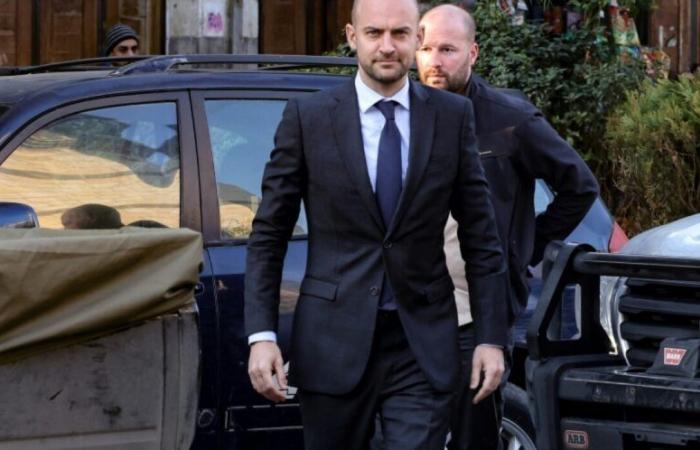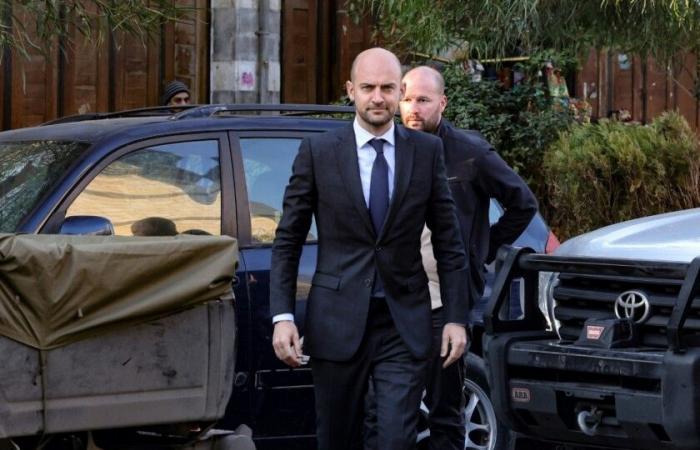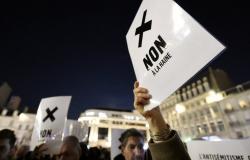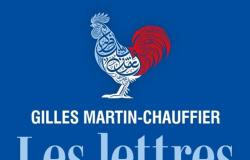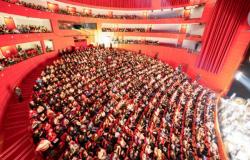This is the first meeting at this level between officials of the major Western powers and Ahmad al-Chareh, who took power on December 8, after the flight of President Bashar al-Assad. Jean-Noël Barrot and Annalena Baerbock, whose visit comes under a mandate from the European Union, met the de facto leader of Syria at the presidential palace, the same place where Assad received his guests.
The first steps of Ahmad al-Chareh, leader of the radical Islamist group Hayat Tahrir al-Sham (HTS) which led the coalition that marched on Damascus, are being closely scrutinized. “Together, France and Germany stand alongside the Syrian people, in all their diversity,” the French minister wrote on X.
The heads of French and German diplomacy, Jean-Noël Barrot, center right, and Annalena Baerbock, center left, in Saydnaya prison, surrounded by Syrian rescuers, in Damascus, Syria, January 3, 2025 – ANWAR AMRO – Damascus (AFP)
Transition. The two countries want to “promote a peaceful and demanding transition in the service of Syrians and for regional stability,” he added. “My trip today, with my French counterpart and on behalf of the EU, is a clear signal to Syrians: a new political start between Europe and Syria, between Germany and Syria is possible said Ms. Baerbock.
“It is with this outstretched hand, but also with clear expectations of the new leaders, that we go to Damascus today,” she added. “We want to support them in this area: in an inclusive and peaceful transfer of power, in the reconciliation of society, in reconstruction,” said the minister, continuing that “we will continue to judge HTS on its actions, despite of our skepticism.
Faced with the challenge of unifying the country, Ahmad al-Chareh pledged to dissolve armed factions, notably the HTS group. He announced his intention to convene a national dialogue, without specifying the date or who would be invited, and indicated that the organization of elections could take four years.
Hope. Ahmad al-Chareh calls for a lifting of international sanctions imposed on the power of Bashar al-Assad after the bloody repression of a popular uprising in 2011, which triggered a war that left more than half a million dead, provoked the exile of millions of inhabitants and fragmented the country. HTS, the former Syrian branch of Al-Qaeda, claims to have broken with jihadism but remains classified as “terrorist” by several Western capitals, notably Washington.
On the site of the French embassy, closed since 2012, Jean-Noël Barrot expressed the hope of seeing “a sovereign, stable and peaceful Syria. It’s a real hope, but it’s a fragile hope,” he added. He announced that “in the coming weeks, depending on the evolution of security conditions, we will gradually prepare the arrangements for reestablishing the French presence.”
Leaders from many Arab and Western countries have rushed to Damascus since the fall of Bashar al-Assad, breaking the isolation imposed on Syria since the violent repression of the popular uprising in 2011. The new power has made a clear shift in policy of Syria, whose main allies were Russia and Iran, moving closer in particular to Turkey and Qatar and outlining overtures towards the West.
French Foreign Minister Jean-Noël Barrot in Damascus, Syria, January 3, 2025 – ANWAR AMRO – Damascus (AFP)
Religious. Jean-Noël Barrot began his visit with a meeting with religious representatives of the Christian community, worried about the arrival of Islamists in power. He also met representatives of civil society, repressed by Assad's power and marginalized.
On the eve of his visit, the minister also had a meeting with the leader of the Syrian Democratic Forces (SDF, dominated by the Kurds), Mazloum Abdi, who fears paying the price for change in Syria. The two men discussed “the ongoing transition in Syria,” said the French Ministry of Foreign Affairs. The two ministers also visited Saydnaya prison, a symbol of the mass repression of Bashar al-Assad's power.
Accompanied by members of the White Helmets, Syrian rescue workers, they visited cells and underground jails where detention conditions were inhumane and where many detainees died under torture. According to the Association of Detainees and the Missing of Saydnaya Prison (ADMSP), more than 4,000 detainees were released there on the day Damascus fell to rebels.
Jonathan SAWAYA with Acil TABBARA in Beirut
© Agence France-Presse

